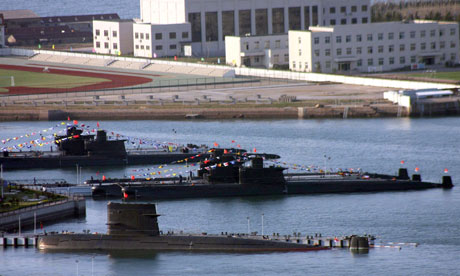
A fleet of Chinese naval submarines: China recently confirmed its navy would be using Seychelles port to refuel. Photograph: Str/AFP/Getty Images
When China recently confirmed that Seychelles would be used as a refuelling port for its navy, it revived popular fears in India of becoming encircled in the Indian Ocean by its larger Asian neighbour.
"Chinese military base in Indian Ocean?" ran the headline of a report in the Times of India, which concluded that "the base could be of vital importance for China as it is about to launch its first aircraft carrier".
But others pointed out that Chinese naval ships engaged in anti-piracy operations off the African coast needed a resupply and recuperating port in the region, especially since they had stopped using Karachi due to the dangerous security situation in Pakistan.
"India is a dominant force in the Indian Ocean, and does not feel threatened at all by China," said Mohan Guruswamy, a strategic affairs expert at Delhi's Centre for Policy Alternatives.
"China is not stupid to attempt to encircle India by setting up naval bases thousands of miles away from home, and within easy striking distance of India's powerful air force," he said.
The debate over China's plans in the Indian Ocean became intense after Beijing got involved in the development of deep-sea commercial ports in a string of littoral states in India's neighbourhood – Burma, Bangladesh, Sri Lanka and Pakistan.
The controversy gets periodically revived with every new development or official pronouncement – before the news from Seychelles, there was excitement over the Pakistan defence minister's claim (denied by Beijing) that Islamabad had asked China to create a naval base at Gwadar and a major new commercial port in Baluchistan built with Chinese money.
The idea that China is seeking to dominate the Indian Ocean by planning a series of strategic naval ports – a "string of pearls" enclosing India – was first suggested by the US defence consultancy firm Booze-Allen Hamilton and reported in the Washington Post in January 2005.
Ever since, there has been deep division among Indian strategic experts over China's ambitions. The debate also retains currency due to Beijing's territorial claims along the 2,500-mile India-China border, a dispute that triggered a brief border war in 1962 and does not appear anywhere near resolution.
"China has so far not put up a strategic doctrine for the Indian Ocean, but my reading is that the 'string of pearls' could become a reality by 2020," said Srikanth Kondapalli, professor of Chinese studies at the Jawaharlal Nehru University.
"China will start showing its teeth only when it becomes an even bigger economic power."
But for now, unlike with the face-off along its land border, Delhi appears unperturbed by the increased Chinese presence in the Indian Ocean. In fact, earlier this month it agreed to engage in a maritime dialogue with Beijing – to be conducted by officials not from the defence but from the foreign ministry.


0 comments:
Post a Comment